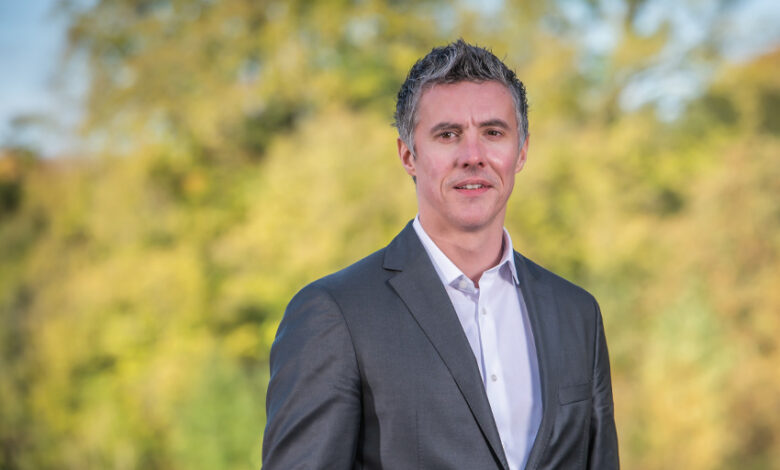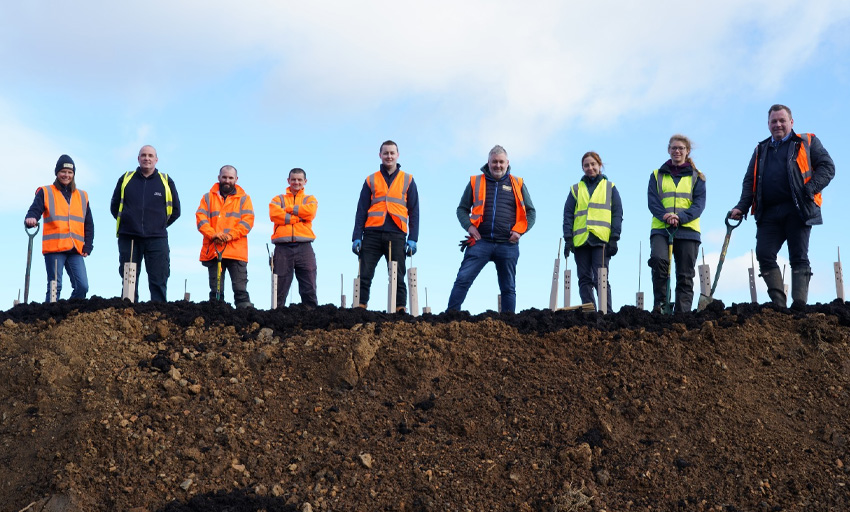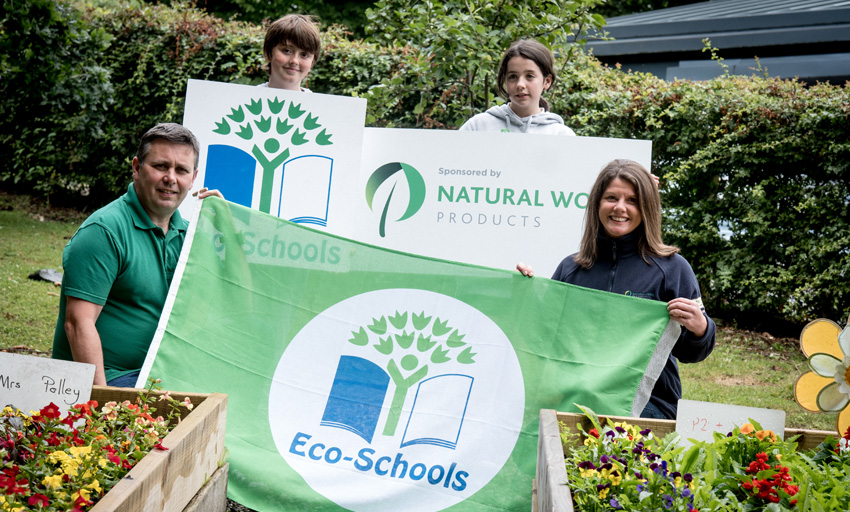The sustainable impact of organics

With climate change, biodiversity, and recycling intrinsically connected, Colm Warren, CEO of Natural World Products, highlights the challenges and necessary work to push forward collectively in order to implement positive structural changes for long-term environmental sustainability.
In just over a year, the UK will move away from using peat within the horticultural retail market, followed by the professional growing market in 2026. Transitioning from peat to compost provides an opportunity for positive change, although many challenges need addressing.
Now that the extraction of peat from highly diverse peatlands, including here in Northern Ireland, has been significantly curtailed, an ever-quickening urgency in progressing sustainable alternatives to peat is needed.
With households in the UK alone producing over 14 million tonnes of organic household waste per annum, we need to consider the structurally vital role products like compost made from household waste can play as peat-based growing media alternatives. Actualising the benefits of organic waste produced into climate-positive products presents a considerable opportunity to provide innovative solutions.
Maximising the quality and quantity of organic waste is essential to offering alternatives to peat. Organic compost is not a direct peat substitute or equivalent – but, as a key foundational building block in new completely peat-free product blends, it has a huge role to play in reducing its use. More research and development at various levels of the value chain is required to produce a wide range of tailored organic growing blends that can produce even better results than peat (especially necessary for professional growing markets), while delivering a significantly lower carbon footprint in the process.
A recent report from the House of Lords titled Sowing the Seeds: A Blooming Horticultural Sector has highlighted how the horticultural sector plays a significant role in delivering key government policies. NWP has been progressing similar research and development within the horticultural and agricultural sectors in the UK and Ireland for a considerable time – and some of the growing trial results are fascinating.
Developing high-quality, tailored finished products suitable for field application and producing nutrient-rich compost products from organics is not easy. Very few do it well at volume in these islands – largely due to a complete lack of government support for the composting industry and soil health more generally historically.
The focus was all, wrongly in our view, on utilising waste organics to produce “renewable” electricity instead. There was little or no thought given to how the massive subsidies available for AD (focused only on the power generation aspects) would completely distort waste collection markets, making them totally unsustainable in the long-term, and lead to disastrous consequences for nutrient and waterway management, given that the primary output of the wet AD process, nutrient loaded liquid digestate, finds its way everywhere and anywhere, completely unmanaged in a wet, nutrient overloaded region like Northern Ireland.
When liquid digestate is misused and over-applied (because there is not enough suitable land mass to accept it in a particular region), it can actually end up destroying soils, rather than helping to fertilise them, killing earthworm activity and running off into our vital waterways. Innovation and collaboration are crucial to addressing such challenges and will, in our view, lead to a wide range of incredible, sustainable tailored growing blends in both agricultural and horticultural settings.
To that end, organic waste and the sensible collection and disposal of it, has a pivotal role to play in meeting head-on some significant structural challenges, including the often overlooked one of finding sustainable alternatives to peat-based growing media in horticulture, as well as helping to reduce the use of synthetic and artificial fertiiser in agriculture.

NWP, as an ever-evolving local company seeking to align itself to addressing a range of serious structural challenges facing the place in which we live, is already well down this road, undistracted as we were by short-term, transactional focused subsidy chases that will never help to create long-term or true sustainability in this sector.
Leading groups, bodies and charities such as the National Trust, The Royal Horticultural Society and the Horticultural Trades Association are all calling for a “radical rethink” in terms of how organic waste might be utilised collectively within the horticultural sector. This broader call demonstrates an understanding of how vital organic waste is to help achieve sustainable progress.
Communication around legislation could always be better and, at times, is made somewhat complex, which can make it difficult for even progressive businesses within horticulture and agriculture to navigate the changes needed to adapt to new ways of thinking and working. The general public also can often be held back from making positive environmental choices through a lack of education and support around what the tangible and local consequences of their desired behavioural changes can actually be.
Education and community engagement are essential elements to driving long-term change. NWP has been actively trying to bring these together. Providing education through various initiatives can reverberate extensively, not least by educating young people on horticulture and its many positive effects. We would like to see horticulture promoted more extensively as part of the main curriculum.
NWP has rolled out several supportive initiatives throughout schools and community groups across Northern Ireland in recent years with a dedicated community outreach department operating within the business. These initiatives include peat-free compost awareness workshops for all sorts of groups, from men’s sheds to charities using growing to promote mental well-being in their local communities, and include us taking our own demonstration peat-free allotments and beds in many of our local council areas. It also extends to our support for the eco-schools project in the northwest and wider initiatives focused on promoting recycling and sustainable food growing education at schools. The team also supports essential local organisations and third sector groups contributing to community well-being and providing positive local environmental benefits.
Increasing the use of products derived from organic waste helps to combat climate change and increase biodiversity. Compost made from organic waste can hugely enrich soils in a number of ways and restoring organic matter back to heavily depleted soils will be a key building block in increasing local biodiversity and assisting the necessary transition of our agricultural and land management practices looking to the future.
For instance, this year’s significant tree planting project at NWP’s Glenside Climate Solutions Park was a rewarding example of a joined-up approach within a circular system, connecting council, charitable bodies and businesses to plant native trees species in the Belfast Hills. An area of over 20 acres will be returned to natural woodland, with all the trees germinated and planted in peat-free compost produced from municipal organic waste produced in the same area.

A recent talk given by NWP Head of Compost, Gavin Saunders and widely-respected horticulturalist Klaus Laitenberger at the Edible Flower Organic Farm in Saintfield highlighted the importance of using peat-free compost to a large and highly motivated group of horticultural enthusiasts. The focus was on the necessary role of the compost cycle within our ecosystem. Compost produces healthy plants, reduces reliance on fertiliser and pesticides, stores carbon in significant volumes and, crucially in the context of Northern Ireland agriculture, helps to conserve water.
Reducing flooding from ever-increasing rainfall is critical and applying organics to improve soil health can be a significant weapon in this regard – a vital topic highlighted at the recent AFBI Soil Health Conference. Soil health is complex, much of the research is still evolving and it will require further in-depth analysis in the years to come. Collaboration is necessary to understand and develop holistic and tailored local strategies. Northern Ireland and this island generally requires its own bespoke solutions, taking account of our own geography and bespoke local circumstances.
Providing relevant education to horticulture, agriculture and the wider public can enable us to demonstrate the critical importance of managing and harnessing the power of waste organics in the most sensible of ways and how vital that well-placed building block can actually be for our region’s sustainability journey.
Addressing huge problems and encouraging systemic change needs a fully joined-up approach from industry, education, councils and local government bodies to ensure we properly understand and harness the connection between the most effective management of our organic waste resources and how that can be critical to helping to address some of our region’s most challenging structural issues in this space.

T: 028 9060 0145
E: colm.warren@nwp-recycle.com
W: www.naturalworldproducts.com





